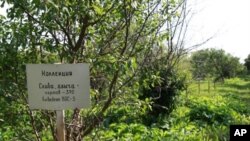Orchards harboring an extremely rare collection of fruit trees and berry plants may go under the bulldozer unless Russia's top leaders grant a stay of execution.
Scientists risked their lives to save part of the collection from the Nazis during World War II. Now scientists are wondering if they can save the collection from real estate developers.
Fight for survival
In September of 1941, Nazi forces were closing in on Leningrad, now known as St. Petersburg. The town of Pavlovsk, 45 kilometers to the southeast, was already coming under fire.
At the Pavlovsk Experimental Station, a collection of 6,000 varieties of potatoes lay ripening under the earth.
That treasure trove of biodiversity held the key to Russia's future potato harvests. It was the raw material to adapt this vital food crop to an ever-changing world.
Scientists at the station knew what they had to do: start digging.
"The Nazis overran the station, but not before the scientists rescued the potato collection," says Cary Fowler, head of the plant conservation group the Global Crop Diversity Trust.
Unique fruit collection
Today, the Pavlovsk Experimental Station is home to Europe's largest collection of fruit trees and berry plants, including more than 300 varieties of plums; 600 kinds of apples and nearly 1,000 types of strawberries; many of them found nowhere else on Earth.
Scientists from the crop preservation group Bioversity International have studied the fields and orchards at Pavlovsk and found much of it is unique, according to Director-General Emile Frison. "And not just unique by the name of the variety, but genetically very unique."
"Some varieties [have] an exceptionally high level of micronutrients and vitamins," nutrients that can help prevent heart disease, cancer, and other diseases, Frison says.
Making way for housing
But the Pavlovsk station's collection may soon be bulldozed to make way for residential development.
Russia's federal housing agency has received permission to build on land where the fruit collection stands. Agency spokesman Andrey Tikhonov says the land is neglected and full of weeds. And besides, he says, officials at Pavlovsk wrote a letter in 2007 asking for the land to be developed.
"When officials speak of a state of neglect at the experimental station, it is a flat-out lie," says Deputy Director-General Sergey Aleksanian at the Vavilov Institute for Plant Industry, the Pavlovsk Experimental Station's parent institution.
"Of course, we cannot care for the plants in the same way as Japanese or Americans attend to their field gene banks," he says, "but the collection is alive, and 50 percent of the credit for that should go to enthusiasm of our scientists, who, faced with lack of money to hire workers, attend to the plants themselves."
And Aleksanian says yes, officials did send the 2007 letter - but they were asking for investors to support the cash-strapped collection, not to bulldoze it.
Dying for biodiversity
Russian plant scientists have a proud history of guarding crop biodiversity.
The Vavilov Institute was established by Nikolay Vavilov, who invented the concept of seed banks. They safeguard the genetic material that future crops may need to respond to pests, diseases and changes in climate.
During the siege of Leningrad in World War II, several Vavilov Institute scientists starved to death surrounded by sacks of rice, oats, and other crops rather than sacrifice the collection.
"How ironic that on the very piece of land where the struggle to conserve crop diversity really began, we now have this collection not threatened by bombs or Nazis, but by real estate developers," says the Global Crop Diversity Trust's Cary Fowler.
The Pavlovsk station lost a court case this month to save the collection. The station's supporters have brought its plight to the attention of Russian President Dmitri Medvedev. According to an official Kremlin Twitter feed, the government is looking into the issue.
Supporters hope Medvedev will step in soon. Otherwise, they say the station will not have time to save the plants before the land is sold.
And the bulldozers won't be far behind.











